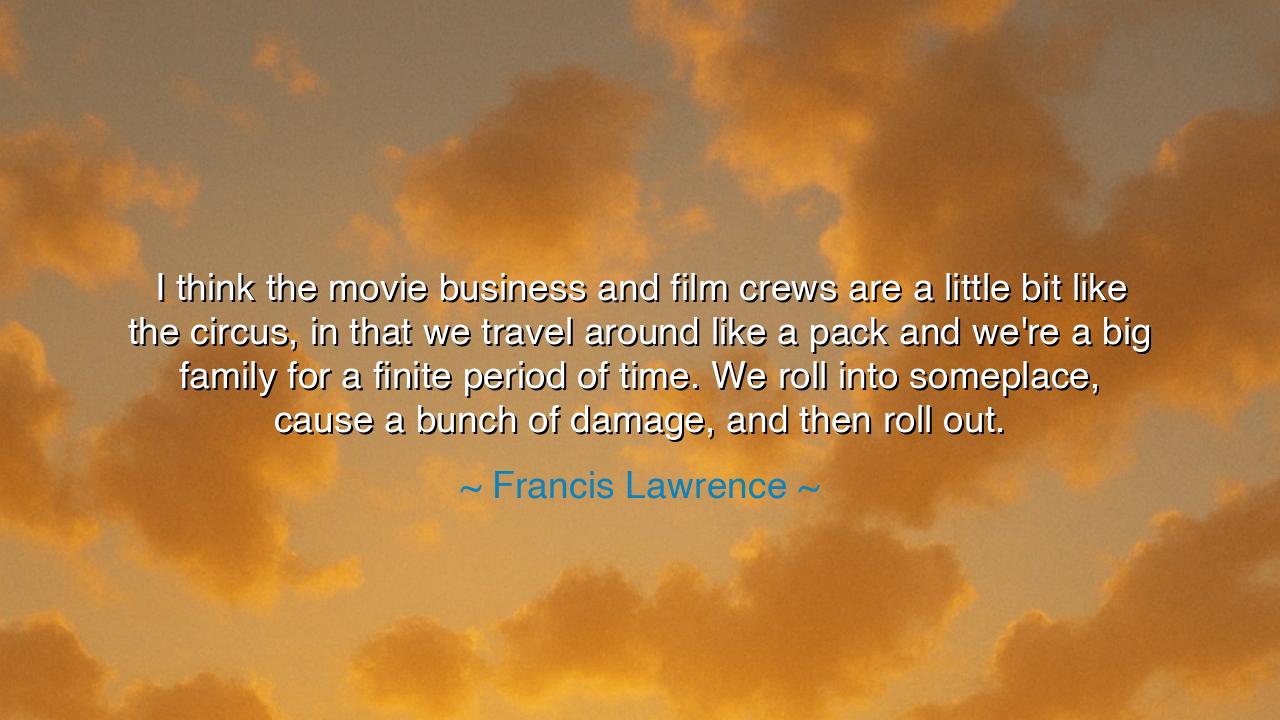
I think the movie business and film crews are a little bit like
I think the movie business and film crews are a little bit like the circus, in that we travel around like a pack and we're a big family for a finite period of time. We roll into someplace, cause a bunch of damage, and then roll out.






"I think the movie business and film crews are a little bit like the circus, in that we travel around like a pack and we're a big family for a finite period of time. We roll into someplace, cause a bunch of damage, and then roll out." So speaks Francis Lawrence, and his words reveal not only the nature of cinema, but the nature of life itself. For what is the circus, if not a moving world of wonder and chaos, beauty and disruption, that arrives suddenly, dazzles the eyes, stirs the heart, and then vanishes like mist? So too is the art of filmmaking—a fleeting fellowship bound by creation, labor, and the pursuit of vision, before it too dissolves into memory.
The ancients would understand this truth. Did not Homer sing of Odysseus and his wandering crew, bound together for a time by the call of the sea, the wrath of the gods, and the search for home? Like a film crew, they rolled into strange lands, caused turmoil by their presence, and departed, leaving behind stories both wondrous and tragic. The journey itself was the bond, not the permanence. Such is the life of those who give themselves to craft and adventure: they form families not of blood but of purpose, and their lives are a chain of arrivals and departures.
And yet, there is beauty in this impermanence. For when men and women come together to build something fleeting—a film, a show, a spectacle—they give a part of themselves that remains forever in the work created. The damage they cause is not destruction alone, but the stirring of the ordinary world. Cities are disrupted, streets are filled with noise and lights, routines overturned. Yet in that disruption, magic is born—worlds of imagination are captured, stories are told that outlive the chaos that birthed them. The circus may leave the field trampled, but the laughter of children and the memory of marvels endure long after.
Consider the tale of Cecil B. DeMille, who once led his crew into the desert to build an entire city for his film The Ten Commandments. He raised monuments and temples like the pharaohs of old, only to leave them buried beneath the sands when filming ended. Though the set was abandoned, the film remained, and generations would look upon his vision with awe. Here is the truth: the crew departed, the city fell silent, but the story endured. So it is with every wandering band of creators—their touch disturbs, but their legacy inspires.
O children of tomorrow, learn this: life itself is like the circus and the film crew. We enter the world, we form bonds, we play our part in the great performance, and then we move on. No stage is permanent, no fellowship eternal. Yet within the brief time we share, there is family, there is labor, there is joy. Do not despise the impermanence, for it is what gives meaning to the moment.
Practical wisdom lies here: when you join a group, a team, or a fellowship, give yourself fully, knowing it will not last forever. Treasure the bonds while they are alive, and honor them when they are gone. Do not mourn the circus because it leaves; rejoice that it came at all. When your role is done, depart with grace, carrying the memory of creation into your next journey.
Thus, the lesson is clear: embrace the transient nature of human bonds. Whether in art, in work, or in life, be like the circus, be like the film crew—bring vitality, create something worth remembering, and when the time comes, move on without regret. For the truest immortality lies not in staying forever, but in leaving behind something that endures long after the tents are folded and the lights go dark.






AAdministratorAdministrator
Welcome, honored guests. Please leave a comment, we will respond soon